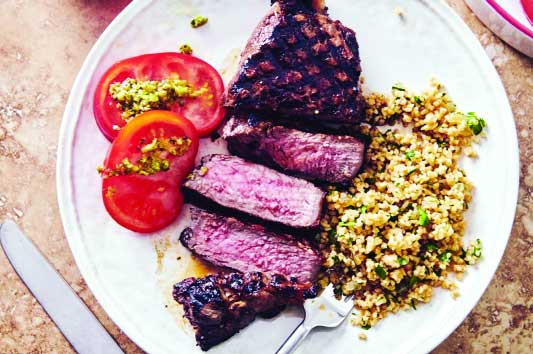Here are a few tips on how to marinate just about anything
Marinating is a terrific basic kitchen technique. Essentially, you can take any kind of meat, fish, seafood or even vegetables or soy products, submerge them in a marinade, and you’ve turned a plain something into a great dinner.
Marinades add flavour — what kind obviously depends on the ingredients and seasonings. You can make or buy anything from a Mediterranean herb and citrus-centered marinade to a ginger and soy-based Asian marinade to an Indian, spice-infused yogurt marinade. It also makes foods more tender. But how long do you marinate chicken? Pork chops? Vegetable kebabs? Tofu? Here’s a primer on all things marinade. Some general guidelines for marinating success:
- The thinner the food, and the less dense it is, the less time it needs in the marinade.
- The more acid (citrus juice, vinegars) there is in the marinade, the less time the food should marinate. Acidic ingredients can start to “cook” the food and change its texture (for example, making it mushy).
- Unless you are marinating food for 20 minutes or less, or the food is a non-meat item like vegetables, make sure you put it in the refrigerator, especially if your kitchen is warm.
Using a Marinade as a Sauce
If you want to use some of the marinade as a sauce, separate it from the rest of the marinade before adding your raw protein.
For food safety, never reuse a leftover marinade or serve it as a sauce; it can contain harmful bacteria. If you’re using the marinade to baste, stop basting with it well before the food is cooked, so any raw meat, fish or poultry juices in the marinade have time to cook away.
Safety Tips for Reusing Marinades
Don’t reuse them, unless the marinade was only used with vegetables (no meat or fish), and even then you should use it within a few days.
Some marinades can be boiled after the raw food is taken out, and then they are safe to use. The marinade should come to a rolling boil and a temperature of at least 165 degrees F. Marinades with a lot of sugar in them might burn though, and with a lot of acidity might change in flavour.
Marinating Times
Some guidelines (most recipes will give you specific instructions):
Chicken:
- Whole chicken: four to 12 hours
- Bone-in pieces: two to six hours
- Boneless pieces: 30 minutes to two hours
Meat:
- Bigger roasts, such as a chuck roast, leg of lamb, pork shoulder: two to eight hours
- Tougher or larger steaks, like strip, T-bone, rib-eye or London broil: one to two hours
- More tender cuts of meat, like sirloin, skirt or flank steak, lamb or pork chops: 30 minutes to one hour
Fish and Seafood:
- Filets, scallops, shrimp: 15 to 20 minutes
- Whole fish, thick fish steaks: 30 minutes
Soy Products:
- Tofu: 30 minutes to one hour
- Seitan and tempeh: one to six hours
Vegetables:
- Dense vegetables, such as carrots, squash, potatoes: one to three hours
- Softer vegetables, such as broccoli, zucchini, tomatoes: 30 minutes to one hour


























